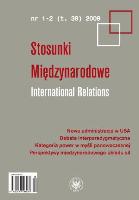WYJAŚNIAĆ CZY INTERPRETOWAĆ: DYLEMATY I WYZWANIA CZWARTEJ DEBATY INTERPARADYGMATYCZNEJ
To explain or to interpret: dilemmas and challenges of the fourth interparadigmatic debate
Author(s): Teresa Łoś-NowakSubject(s): Politics / Political Sciences
Published by: Wydawnictwa Uniwersytetu Warszawskiego
Keywords: behawiorystyka; Scott Burchill; nurt neorealistyczny; polityka midzynarodowa;
Summary/Abstract: The author raises several questions which are important not just for the discussion concerning the identity of international relations as a discipline, but also for the credibility of research fi ndings, and the capacity to interpret and predict. Among the most important of these are without doubt questions concerning research methods and tools, concerning the ability of researchers to extract from the international environment surrounding them, the central problems of the rapidly changing contemporary world, and symptoms of change in the international system, and in this connection, questions concerning the symbols and vehicles of the changes taking place in the fi eld of international relations. Ontological and epistemological issues relating to the discipline of international relations have been the subject of discussion since the fi rst serious interparadigmatic debate in the late 1950s and early 1960s engaged in by representatives of the realist school and the new behavioural approach, through to the most recent debate in the 1980s and 1990s. This lengthy discussion has not discouraged specialists in the fi eld from continuing their careful and thoughtful refl ection on the condition of the discipline and its place in the pantheon of learning. It should also certainly not be a discouragement to a deepening of the theoretical debate concerning the explanatory effectiveness of various theoretical approaches and their methodological correctness in the process of investigating and explaining the complexities of the modern world and the new challenges confronting us in the 21st century. Without doubt, the new theoretical approaches are breaking down the classic, “correct” analytical models, and introducing elements of an intersubjective interpretation of new phenomena and processes taking place in the international environment. As a result, these phenomena and processes are more diffi cult to understand, new risks are developing and opportunities are declining for the contemporary world to develop. This world is disoriented by the intellectual trap of post-modernism in which the “old” principles for explaining international processes and phenomena, such as the crisis of the state, derogation from international law, morality and other such values are turning out not to be fully effective, and either there are no new principles or where they are proposed, they fail to gain universal acceptance.
Journal: Stosunki Międzynarodowe
- Issue Year: 39/2009
- Issue No: 1-2
- Page Range: 29-47
- Page Count: 19
- Language: Polish

